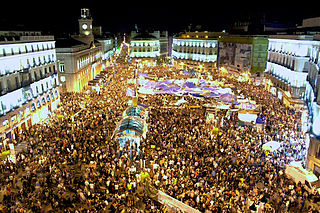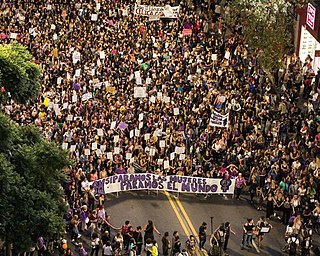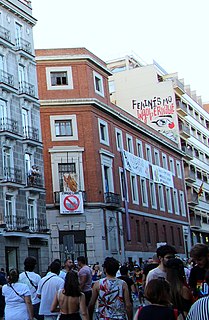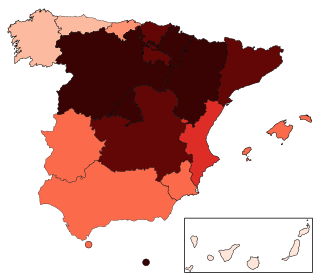Related Research Articles

Adolfo Suárez Madrid–Barajas Airport, commonly known as Madrid–Barajas Airport, is the main international airport serving Madrid in Spain. At 3,050 ha in area, it is the second-largest airport in Europe by physical size behind Paris–Charles de Gaulle Airport. In 2019, 61.8 million passengers travelled through Madrid–Barajas, making it the country's busiest airport as well as Europe's sixth-busiest.

The 1989 Spanish general election was held on Sunday, 29 October 1989, to elect the 4th Cortes Generales of the Kingdom of Spain. All 350 seats in the Congress of Deputies were up for election, as well as 208 of 254 seats in the Senate. An election had not been due until 28 July 1990 at latest, but Prime Minister Felipe González called for a snap election nine months ahead of schedule, allegedly on the need of implementing tough economic measures. González hoped to capitalize on a still strong economy and his party's electoral success in a European Parliament election held in June, after a troubled legislature which had seen an increase of social protest on his government's economic policy and the calling of a massive general strike in 1988.

The 1989 European Parliament election in Spain was held on Thursday, 15 June 1989, as part of the EU-wide election to elect the 3rd European Parliament. All 60 seats allocated to Spain as per the 1985 Treaty of Accession were up for election.

Metropolitano Stadium, also referred to as Wanda Metropolitano for sponsorship reasons, is a stadium in Madrid, Spain. It has been the home stadium of Atlético Madrid since the 2017–18 season. It is located in the Rosas neighbourhood, in the San Blas-Canillejas district.

Confederación de Sindicatos Unitarios de Trabajadores was a trade union centre in Spain.

The anti-austerity movement in Spain, also referred to as the 15-M Movement, and the Indignados Movement, was a series of protests, demonstrations, and occupations against austerity policies in Spain that began around the local and regional elections of 2011 and 2012. First starting on 15 May 2011, many of the subsequent demonstrations spread through various social networks such as Real Democracy NOW and Youth Without a Future.

The Empresa Municipal de Transportes de Madrid is the company charged with the planning of public urban transport in the city in Madrid, Spain. The organization is wholly owned by the City Council of Madrid and is a member of the Consorcio Regional de Transportes de Madrid. Among the services provided by EMT Madrid are urban bus transportation as well as the BiciMAD bicycle-sharing system.
The Alianza Apostólica Anticomunista was a Spanish far-right paramilitary organisation active from 1976 to 1983, primarily in the southern Basque Country but also in the French Basque Country and Barcelona. A June 2010 report by the Office for Victims of Terrorism of the Basque Government attributed eight murders with 66 deathly victims to the group and linked it to the National Police Corps, SECED and the Civil Guard. The group attacked the satirical magazine El Papus in Barcelona, killing one person and injuring 17.

Cabify is a Spanish ridesharing company which provides vehicles for hire via its smartphone mobile app. Vehicles are driven by self-employed service providers. Operating in Spain, Portugal and Latin America, the company offers two services, one for businesses and another for individuals.

The 2018 Copa del Rey de Baloncesto was the 82nd edition of the Spanish King's Basketball Cup, won by FC Barcelona Lassa against former 4-time reigning champions Real Madrid. The competition is managed by the ACB and was held in Las Palmas, in the Gran Canaria Arena in February 2018.

On the afternoon of 17 August 2017, 22-year-old Younes Abouyaaqoub drove a van into pedestrians on La Rambla in Barcelona, Catalonia, Spain killing 13 people and injuring at least 130 others, one of whom died 10 days later on 27 August. Abouyaaqoub fled the attack on foot, then killed another person in order to steal the victim's car to make his escape.

Íñigo Joaquín de la Serna Hernáiz is a Spanish politician and civil engineer. He was the Mayor of Santander between 2007 and 2016 and served as Minister of Public Works from 4 November 2016 to 1 June 2018.

Together for Catalonia is an electoral and parliamentary alliance in Catalonia, registered as a political party in the interior ministry in July 2018, originally envisaged as a platform comprising the Catalan European Democratic Party (PDeCAT), successor of the late Democratic Convergence of Catalonia (CDC), and independents and centered around the candidacy of former Catalan president Carles Puigdemont ahead of the 2017 Catalan regional election. Some of these independents went on to form the Action for the Republic (AxR) political party, which is also part of the alliance in the Parliament of Catalonia.

The International Women's Strike or International Feminist Strike 8-M was a movement that took place on March 8, 2018, International Women's Day. It was organized by feminist movements in support of women's rights across the world. It was supported by over 170 countries and a large number of related local activities.
Constantino Bértolo is a Spanish publisher and writer. He studied Spanish philology at Complutense University in Madrid. He is regarded as one of the most respected literary critics in Spain, and he is also a well-known publisher and literary editor. He has written critical pieces for a variety of publications, including the magazine El Urogallo, and the newspapers El País and El Independiente.

La Ingobernable is a series of self-managed social centres in central Madrid, Spain. The squats have been used by feminist, environmentalists, LGBTI, anti-racist and other cultural groups. Between 2017 and 2019, the La Ingobernable was based in a municipal building located at the corner of Paseo del Prado and Calle del Gobernador. It was then located at Calle Alberto Bosch 4, behind the Prado Museum from March until April 2020, when it was evicted during the state of alarm. In 2021, an Office for Social Rights was set up at Calle Cruz 5.

The COVID-19 pandemic in Spain has resulted in 12,179,234 confirmed cases of COVID-19 and 105,642 deaths.

Squatting in Spain refers to the occupation of unused or derelict buildings or land without the permission of the owner. In Francoist Spain migrant workers lived in slums on the periphery of cities. During the Spanish transition to democracy, residential squatting occurred in Spanish cities such as Barcelona, Bilbao, Madrid, Valencia and Zaragoza. From the 1980s onwards a new generation of squatters set up self-managed social centres which hosted events and campaigns. The 1995 Criminal Code among other things criminalised squatting, but failed to stop it. Social centres exist across the country and in Barcelona and Madrid in particular. In the Basque Country they are known as gaztetxes.

On 16 February 2021, the Spanish rapper Pablo Hasél was arrested and imprisoned in his hometown of Lleida, Catalonia for two final sentences by order of the Audiencia Nacional in Madrid: a 2-year prison sentence for glorification of terrorism in his songs and a second sentence of 9 months in prison for glorification of terrorism in a song and several tweets, as well as a fine of 10,800 euros for Lèse-majesté and another of 6,750 euros for insulting state institutions, which add up to days in prison for each instalment he fails to pay. His imprisonment sparked a wave of protests and has coincided with the government's announcement of a reform of crimes related to freedom of expression.
References
- ↑ "Los maquinistas de Metro de Madrid, de huelga durante el Orgullo Gay". EL PAÍS (in Spanish). 2017-06-29. Retrieved 2017-07-16.
- ↑ Santos, Amara (2017-06-30). "La huelga de maquinistas de Metro provoca largas esperas en los andenes". EL PAÍS (in Spanish). Retrieved 2017-07-16.
- ↑ Blanchar, Stefania Gozzer Arias, Clara (2016-02-18). "Metro mantiene la huelga durante el Mobile World Congress". EL PAÍS (in Spanish). Retrieved 2017-07-16.
- ↑ Blanchar, Stefania Gozzer Arias, Clara (2016-02-18). "Metro mantiene la huelga durante el Mobile World Congress". EL PAÍS (in Spanish). Retrieved 2017-07-16.
- ↑ Figuls, Josep Catà (2017-06-29). "Barcelona se queda sin taxis en una huelga de 24 horas contra Uber y Cabify". EL PAÍS (in Spanish). Retrieved 2017-07-16.
- ↑ Figuls, Josep Catà (2017-06-29). "Barcelona se queda sin taxis en una huelga de 24 horas contra Uber y Cabify". EL PAÍS (in Spanish). Retrieved 2017-07-16.
- ↑ Figuls, Josep Catà (2017-06-29). "Barcelona se queda sin taxis en una huelga de 24 horas contra Uber y Cabify". EL PAÍS (in Spanish). Retrieved 2017-07-16.
- ↑ Figuls, Josep Catà (2017-06-29). "Barcelona se queda sin taxis en una huelga de 24 horas contra Uber y Cabify". EL PAÍS (in Spanish). Retrieved 2017-07-16.
- ↑ "Los maquinistas de Metro de Madrid, de huelga durante el Orgullo Gay". EL PAÍS (in Spanish). 2017-06-29. Retrieved 2017-07-16.
- ↑ "Los maquinistas de Metro de Madrid, de huelga durante el Orgullo Gay". EL PAÍS (in Spanish). 2017-06-29. Retrieved 2017-07-16.
- ↑ Coruña, La Opinión de A. "El primer día de huelga de autobuses afecta a 67.500 escolares y al 90% de las líneas regulares" . Retrieved 2017-07-16.
- ↑ Press, Europa (2017-06-21). "La huelga de buses paraliza el sector y 57.000 alumnos vuelven a quedarse sin transporte". europapress.es (in European Spanish). Retrieved 2017-07-16.
- ↑ Press, Europa (2017-06-21). "La huelga de buses paraliza el sector y 57.000 alumnos vuelven a quedarse sin transporte". europapress.es (in European Spanish). Retrieved 2017-07-16.
- ↑ Press, Europa (2017-06-21). "La huelga de buses paraliza el sector y 57.000 alumnos vuelven a quedarse sin transporte". europapress.es (in European Spanish). Retrieved 2017-07-16.
- ↑ Coruña, La Opinión de A. "El primer día de huelga de autobuses afecta a 67.500 escolares y al 90% de las líneas regulares" . Retrieved 2017-07-16.
- ↑ Coruña, La Opinión de A. "El primer día de huelga de autobuses afecta a 67.500 escolares y al 90% de las líneas regulares" . Retrieved 2017-07-16.